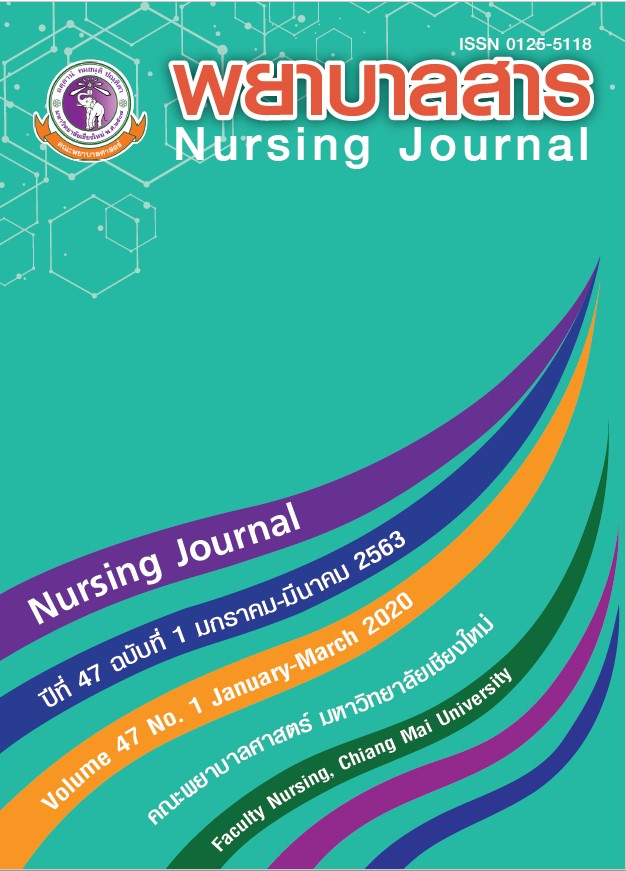Factors Predicting Readiness for Hospital Discharge Among Postpartum Mothers
Keywords:
Hospital discharge, Discharge readiness, Teaching quality, Care coordination, Postpartum motherAbstract
Readiness for hospital discharge is necessary for postpartum mothers. This helps mothers effectively face with physical, mental, and adaptive changes in the postpartum period. The purpose of this predictive correlational research study was to explore readiness for hospital discharge and the predicting factors of readiness for hospital discharge among postpartum mothers. The subjects were 80 mothers who gave birth and stay in the postpartum care unit at Maharaj Nakorn Chaing Mai or Nakornping Hospitals from January to August 2016. The participants were criteria selected. The assessment tools were the readiness for hospital discharge questionnaire, the teaching quality questionnaire and the care coordination questionnaire. The reliability of the readiness for hospital discharge questionnaire, the teaching quality questionnaire of Sirirat Panuthai and the care coordination questionnaire that was modified by Preeyakamon Krikitrat and Kannika Kantaruksa. The tools were tested reliability by using Cronbach’ alpha coefficient, were 97, .97 and .96, respectively. Descriptive statistics, Spearman's product moment correlation and stepwise multiple regression were used to analyze the data.
Results of the study revealed that:
- 65.00 % of Postpartum mothers perceived about readiness for hospital discharge at high level and mean score was 193.08 (S.D. = 25.20).
- 58.75% of Postpartum mothers perceived about teaching quality at high level and mean score was 208.41 (S.D. = 35.82).
- 70.00 % of Postpartum mothers perceived about care coordination at high level and mean score was 101.63 (S.D. = 18.35).
- Teaching quality had a high positive correlation with readiness for hospital discharge (r = .513, p< .01). Care coordination had moderate positive correlation with readiness for hospital discharge (r = .465, p< .01).
- Teaching quality and care coordination can predict readiness for hospital discharge among postpartum mothers at a percentage of 33.0 (p< .01).
The result of this study will be the basic information about readiness for hospital discharge of postpartum mother.
References
American Academy of Pediatrics. (1992). Guidelines for perinatal care (3 rded). Washington, DC: Elk Grove Village.
Barnes, S. (2000). Ambulatory surgery: Are you watching the clock? Let criteria define discharge readiness. Journal of Peri Anesthesia Nursing, 15, 174-176. doi:10.1053/jpan.2000.7512
Brown, S., Small, R., Argus, B., Davis, P. G., & Krastev, A. (2009) . Early postnatal discharge from hospital for healthy mothers and term infants (Review). Retrieved from http://apps.who.int/rhl/reviews/langs/CD002958.pdf
Catz, C., Hanson, J. W., Simpson, L., & Yaffe, S. J. (1995). Summary of a workshop: Early discharge and neonatal hyperbilirubinemia. Pediatrics, 96, 743-745.
Cohen, J. (1988). Statistical of power analysis for the behavioral science. New Jersy: Lawrence Erlbaum associate.
Kleinpell, R. (2004). Randomized trial of an intensive care uni t-based early discharge intervention for critically ill elderly patients. American Journal of Critical Care, 13(4), 335-345.
Meleis, A. I., Sawyer, L.M., Im, E-O., Messias, D.K., & Schumacher, K. (2000). Experiencing transitions: An emerging middle-range theory. Advanced Nursing Science, 23(1), 12-28.
Panuthai, S. (2014a). The Readiness for Hospital Discharge Scale: RHDS. Chiang Mai: Faculty of Nursing, Chiang Mai UniversityPanuthai, S. (2014b). The Quality of Discharge Teaching Scale (QDTS). Chiang Mai: Faculty of Nursing, Chiang Mai University.
Panuthai, S. (2014c). The Care Coordination Scale (CCS). Chiang Mai: Faculty of Nursing,Chiang Mai University.Posmontier, B. (2008). Functional status outcomes in mothers wi th and without postpartum depression. Journal of Midwifery & Women’s Health, 53(4), 310-318.
Weiss, M., Ryan, P., & Lokken, L. (2006). Validity and reliability of the perceived readiness for discharge after birth scale. Journal of Obstetric, Gynecologic, & Neonatal Nursing, 35 (1),34-45. doi:10.1111/j.1552-6909.2006.00020.x
Weiss, M. & Piacentine, L.B. (2006). Psychometric properties of the readiness for hospital discharge scale. Journal of Nursing Measurement, 14 (3), 163–180.
Weiss, M., Piacentine, L. B., Lokken, L., Ancona, J., & Archer, L. (2007). Perceived readiness for hospital discharge in adult medical-surgical patients. Clinical Nurse Specialist, 21(1), 31-42.
Weis, E. M., & Lokken, L. (2009). Predictors and Outcomes of Postpartum Mothers, s Perceptions of Readiness for Discharge after Birth. Journal of Obstetric, Gynecologic, & Neonatal Nursing, 38(4), 406-417. doi:10.1111/j.15526909.2009.01040.x
Downloads
Published
How to Cite
Issue
Section
License
บทความที่ได้รับการตีพิมพ์เป็นลิขสิทธิ์ของวารสารพยาบาลสาร
ข้อความที่ปรากฏในบทความแต่ละเรื่องในวารสารวิชาการเล่มนี้เป็นความคิดเห็นส่วนตัวของผู้เขียนแต่ละท่านไม่เกี่ยวข้องกับมหาวิทยาลัยเชียงใหม่ และคณาจารย์ท่านอื่นๆในมหาวิทยาลัยฯ แต่อย่างใด ความรับผิดชอบองค์ประกอบทั้งหมดของบทความแต่ละเรื่องเป็นของผู้เขียนแต่ละท่าน หากมีความผิดพลาดใด ๆ ผู้เขียนแต่ละท่านจะรับผิดชอบบทความของตนเองแต่ผู้เดียว






